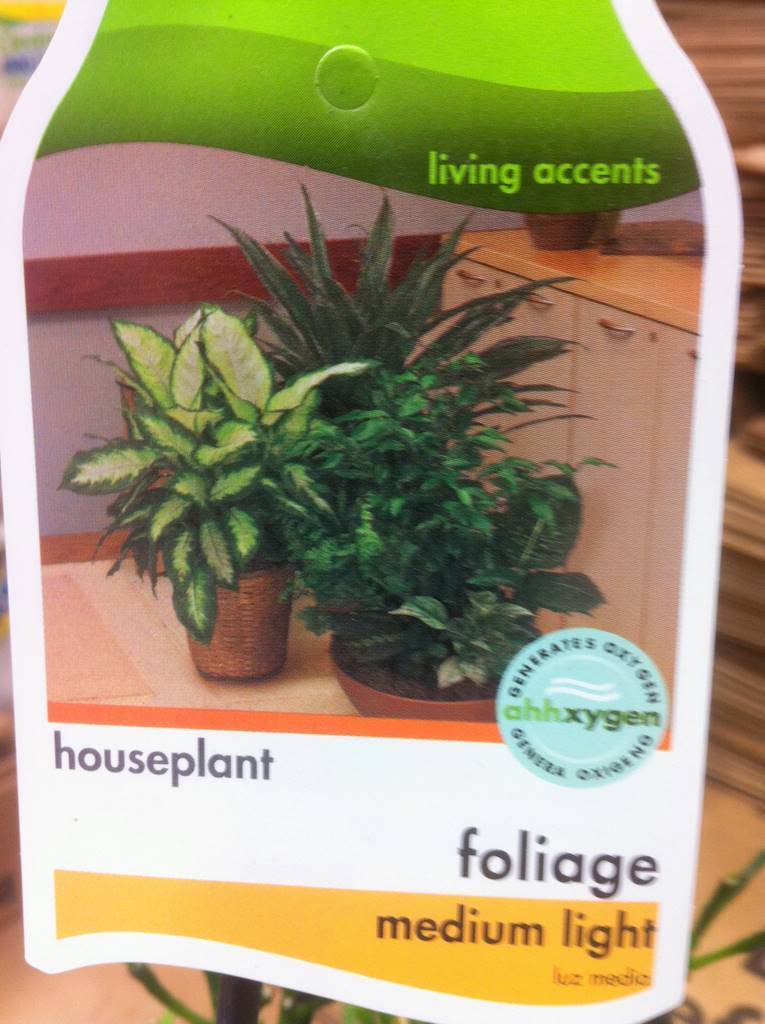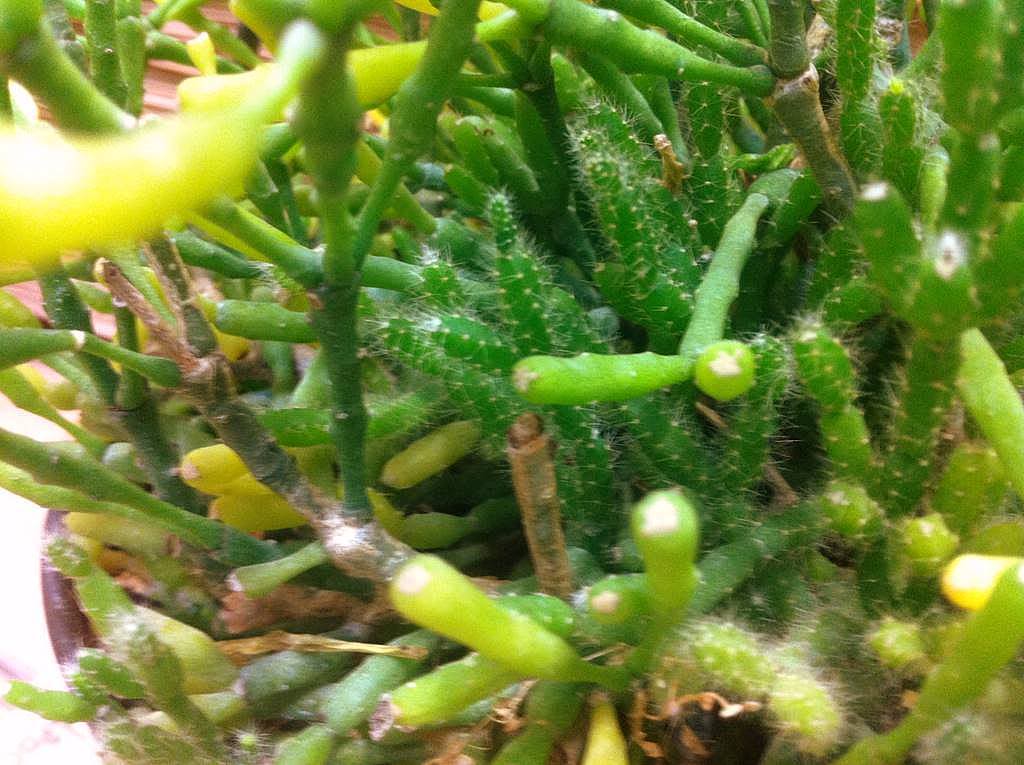The other day when I was at the "strange" Home Depot (renting the concrete saw), I took some time to scope out their garden center. For the most part this was entirely depressing, as they didn't even have a dedicated room for the indoor plants like my local HD does -- they just had them off in one corner of the main store. The cactus and other succulents were pretty much growing in darkness. What a shame!
I did find something interesting though: This succulent in a hanging basket.
The texture of it caught my eye first, and its wonderful green color didn't hurt either:
One disadvantage of having the plants out in the main store is that I couldn't just investigate in peace -- as soon as I took the basket down and started taking photos a helpful (?) employee asked if I needed any help. Of course I said "no thanks, I'm fine", but what I should have said was: "yes, thank you. What species is this, and what part of the world does it come from?"
Because the plant tag was present, but extremely unhelpful:
Ah, it's a "houseplant". Thanks, that's very helpful! There are a few nuggets of truth on this tag though:
- This is "living" (not plastic!)
- It produces oxygen (hey, I like oxygen!)
- And it needs light (unlike the other succulents growing on the dark shelves I guess).
So I'm out of luck on getting help with the ID there. I had a feeling that I saw a plant like this in one of Gerhard's posts on Bamboo, Succulents, and More, but I'm not sure how to find it.
I resorted to observation then and photos, hoping I could get an ID later. Looking closely at the interior of the plant, it appears that there may be a second type of plant mixed in:
The majority of the plant was smooth and spineless, but in there, plenty of spines.
I'm pretty sure I determined that the prickly parts were connected to the smooth parts, but now I can't be certain. If they are, does this mean that the entire plant will eventually become prickly? Or is this really two separate plants?
I checked another specimen they had and it too had the prickly interior, so I'm thinking it's how this plant is -- there's not a second type of plant in there. If that's so, then this thing will become quite dangerous in almost no time... and I'm not sure if I can handle that. (I had a cactus that I was allergic to once -- just brushing against its sharp spines would cause much itching and swelling. I got rid of that plant after several years.)
This is such a pretty plant though! Interesting too, and unique. I'm hoping for an ID in the comments below so I can do a bit more research.
Then maybe I'll stop back in the next time I'm in that part of town and pick up a cool new succulent!
.






Ah, yes. I've had several (un)helpful trips to Home Depot and other big box warehouses when I needed that emergency plant. There comes a time when you realize you have more horticultural knowledge than the entire staff combined. (and 'they' are supposed to help 'you'?) But that's when I start helping other customers who mistake me for an employee! Always fun. And I love your 'nuggets of truth' from that tag - hilarious!
ReplyDeleteI wish I could offer help ID-ing the plant. Although to me it looks like something that belongs on a coral reef. I'm interested to see what others think.
When I saw the first photo, I thought it was a medusoid euphorbia (like Euphorbia flanaganii) but on closer look this appears to be a cactus, not a euphorbia. I'm not an expert on epiphytic cacti but your plant looks like a rhipsalis species. This site might be helpful: http://cactiguide.com/cactus/?genus=Rhipsalis.
ReplyDeleteSorry I can't give you an exact ID...
Gotta love those tags. My favorite are the "cactus gardens" that are completely made up of succulents, not a cactus in sight.
ReplyDeleteFor this one I'm going with "drunkard's dream" or Hatiora salicornioides or Rhipsalis Salicornioides.
Rhipsalis - Drunkard's Dream
Botanical Name: Rhipsalis Salicornioides
Origins: Brazil
Light: Low Light
Watering: Every 8+ Days
Growth Speed: Slow
danger: will the whole plant eventually get prickly? If the growth is truly "slow", then this plant is a bargain -- it was $10!
ReplyDeleteIf its the Rhipsalis, they don't grow anywhere near as slow as claimed. Mine have always grown fairly quickly. I throw leaves in a blender and make a fine mulch, and make potting soil out of it, 50% leaves, 30% crumbled rotted wood, and the rest in sandy loamy dirt. Works great. I went and left mine in the greenhouse through a really hard freeze with no added heat- so I think they're toast. I had 'em for years before that smooth move. They bloom in tiny yellow daisies. No prickles to speak of on mine, either. Really lovely plant.
ReplyDeleteInteresting looking plant, I'll be interested to know what it is.
ReplyDeleteI just happened to come across your post when I googled DIY succulent hanging basket. I too have the same plant from HD and do not know what the hell it is, other than a succulent. Mine had no tag. But little good it would have been. I have had mine for almost three years. It lives outside in its pot in the summer and then I bring it in in the winter as a house plant. It grows well, but does loss it's foliage quite a bit.
ReplyDeleteIf you have found out what it is, please pass the info along.
Jessica
It looks like one I recently purchased also from a "big box" and was incorrectly labeled a hedgehog aloe. I think it's a finger jade or crassula ovata.
ReplyDeleteMy Roommates mom gave us this plant about a year ago, apparently she's had it for a long time. To our surprise this plant started blooming this past spring small yellow flowers! very cool!
ReplyDeleteThis may be too late to do any good, but the plant in question is a Hatiora salicornioides. The spines are frequently present on young growth, but fall off as it matures.
ReplyDeleteNate: Thanks for the ID -- Hatiora salicornioides or Dancing Bones Cactus. :)
ReplyDeletedrunkard's dream. not prickly. you got a bonus cactus in the pot.
ReplyDelete